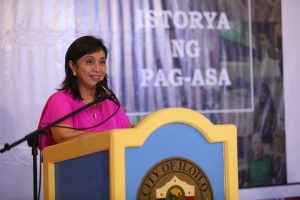All eyes are on the presidential candidates who will compete in the 2022 Philippine elections, one of whom will succeed President Rodrigo Duterte and lead a government battered by pandemic and economic woes. Also important is the battle for the vice presidency, a position elected separately from the president: the winner will not just become a de facto contender for the 2028 elections but will also become a significant political figure who may choose to play a crucial role in deciding what will happen to Duterte after the end of his term.
Under the Philippine Constitution, the vice president has no other role than to wait if the president is no longer able to fulfill his or her mandate because of sickness or death. It is up to the president to decide whether a cabinet position will be given to the vice president.
Because of this, it is possible that the president and vice president may belong to different parties, which can be a source of tension and even threaten to destabilize an administration. Except during the term of former President Gloria Arroyo, from 2004 to 2010, all presidents since 1992 had to deal with a vice president who belonged either to the opposition or a minority party.
Duterte’s 2016 election victory may have been phenomenal, but it was not enough to convince voters to choose his running mate. Instead, voters elected then Congresswoman Leni Robredo, the candidate of the previous ruling party. Since 2016, Robredo assumed the role of being the leader of the opposition party although she briefly held the position of Housing Secretary under the Duterte government.
It is certainly better for any government that the country’s top two leaders enjoy good working relations. Otherwise, important matters of governance can be undermined by partisan politics. In the past five years, Duterte led the trolling against Robredo even if the vice president has expressed willingness to support programs that benefit the poor.
The last thing that the Philippines needs today amid the pandemic and its economic fallout is constant bickering among its leaders. Hence, the importance of carefully selecting the vice president who will ideally partner with the president in leading the new government in 2022.
Until last month, Duterte was floating the idea that he is ready to run for vice president. In the end, he decided to run for the Senate instead. He endorsed Senator Christopher “Bong” Go, his former aide, as the vice presidential candidate of the ruling party. But Go withdrew when presidential daughter Sara Duterte, the mayor of Davao City, filed her candidacy for vice president as substitute candidate in another party. This didn’t sit well with the elder Duterte who threatened not to support Mayor Duterte and her running mate for president, former Senator Ferdinand “Bongbong” Marcos Jr.
If there were cracks within the ruling coalition, opposition parties fared no better in their bid to unite. In October, Robredo filed her candidacy as president with Senator Kiko Pangilinan as her running mate. Presidential candidate Senator Panfilo Lacson chose Senate President Tito Sotto as his vice president. Presidential aspirant Manila Mayor Isko Moreno partnered with Dr Willie Ong, a physician with a large social media following. Presidential candidate Senator Manny Pacquiao tapped Buhay partylist Representative Lito Atienza to help him in the elections. Presidential candidate labor leader Leody de Guzman will be supported by former Congressman Walden Bello, a veteran activist and scholar.
Mayor Duterte was the last to declare her intent to run for vice president but it doesn’t mean she lacks political support. As the daughter of the country’s president, she is the obvious candidate of the ruling party even if she is heading another party. It is odd that President Duterte’s ruling party has no candidate for president, following Go’s recent decision not to pursue his presidential candidacy, but it may be inclined to endorse the running mate of Mayor Duterte.
Mayor Duterte could cite her experience as local chief executive for nine years but her rivals also have outstanding credentials. Pangilinan, Sotto, and Atienza are longtime politicians and lawmakers. Ong is a noted health expert while Bello is a prolific author and university professor. Pangilinan and Bello have consistently criticized the human rights record of the Duterte government.
But the opposition’s main failing has been its inability to unite around a single candidate who can challenge the candidate endorsed by President Duterte. This will divide the votes of those who are already dissatisfied with the Duterte government, aside from making it more difficult to convince the electorate that the election is a choice between those who support and resist authoritarianism.
But Mayor Duterte should not underestimate the constituency that is solidly opposed to her father’s government. Her candidacy represents the continuity of what her father started in 2016 and this could just be the opportunity that could mobilize opposition forces to unite and defeat Duterte in 2022. For Duterte supporters, the election offers a chance to vote in favor of his legacy. For those opposed to him, there is an opportunity to push back against his repressive regime and a reversal of his anti-poor policies by campaigning against the Duterte dynasty in the local and national elections.

































